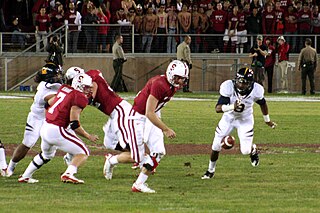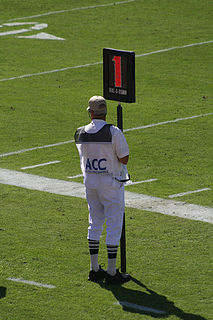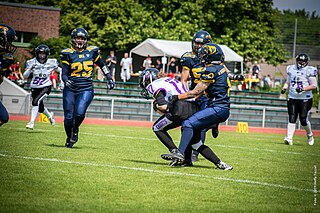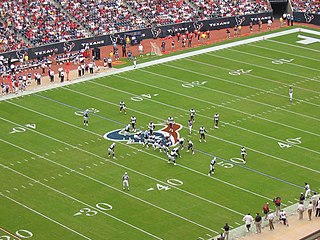Related Research Articles

Canadian football is a sport played in Canada in which two teams of 12 players each compete for territorial control of a field of play 110 yards (101 m) long and 65 yards (59 m) wide attempting to advance a pointed oval-shaped ball into the opposing team's scoring area.

A fumble in gridiron football occurs when a player who has possession and control of the ball loses it before being downed (tackled), scoring, or going out of bounds. By rule, it is any act other than passing, kicking, punting, or successful handing that results in loss of ball possession by a player.

Touch football is a variant of American football and Canadian football in which the basic rules are similar to those of the mainstream game, but instead of tackling players to the ground, the person carrying the ball need only be touched by a member of the opposite team to end a down. The game is usually played by amateurs on a recreational basis.

A touchdown is a scoring play in gridiron football. Whether running, passing, returning a kickoff or punt, or recovering a turnover, a team scores a touchdown by advancing the ball into the opponent's end zone.

A down is a period in which a play transpires in gridiron football. The down is a distinguishing characteristic of the game compared to other codes of football, but is synonymous with a "tackle" in rugby league. The team in possession of the football has a limited number of downs to advance ten yards or more towards their opponent's goal line. If they fail to advance that far, possession of the ball is turned over to the other team. In most situations, if a team reaches their final down they will punt to their opponent, which forces them to begin their drive from further down the field; if they are in range, they might instead attempt to score a field goal.

American and Canadian football are gridiron codes of football that are very similar; both have their origins in rugby football, but some key differences exist.
Strategy forms a major part of American football. Both teams plan many aspects of their plays (offense) and response to plays (defense), such as what formations they take, who they put on the field, and the roles and instructions each player are given. Throughout a game, each team adapts to the other's apparent strengths and weaknesses, trying various approaches to outmaneuver or overpower their opponent in order to win the game.

Gameplay in American football consists of a series of downs, individual plays of short duration, outside of which the ball is dead or not in play. These can be plays from scrimmage – passes, runs, punts, or field goal attempts – or free kicks such as kickoffs and fair catch kicks. Substitutions can be made between downs, which allows for a great deal of specialization as coaches choose the players best suited for each particular situation. During a play, each team should have no more than 11 players on the field, and each of them has specific tasks assigned for that specific play.
In sports, running out the clock is the practice of a winning team allowing the clock to expire through a series of pre-selected plays, either to preserve a lead or hasten the end of a one-sided contest. Such measures expend time, but do not otherwise have a tactical purpose. This is usually done by a team that is winning by a slim margin near the end of a game, in order to reduce the time available for the opposing team to score. Generally, it is the opposite strategy of running up the score.

In American football and Canadian football, a quarterback kneel, also called taking a knee, genuflect offense, kneel-down offense, or victory formation occurs when the quarterback immediately kneels to the ground, ending the play on contact, after receiving the snap. It is primarily used to run the clock down, either at the end of the first half or the game itself, to preserve a lead. Although it generally results in a loss of a yard and uses up a down, it minimizes the risk of a fumble, which would give the other team a chance at recovering the ball.

In American football, the specific role that a player takes on the field is referred to as their "position." Under the modern rules of American football, both teams are allowed 11 players on the field at one time and have "unlimited free substitutions," meaning that they may change any number of players during any "dead ball" situation. This has resulted in the development of three task-specific "platoons" of players within any single team: the offense, the defense, and the so-called 'special teams'. Within these three separate "platoons", various positions exist depending on the jobs that the players are doing.
Street football, also known as backyard football or sandlot football, is a simplified variant of American football primarily played informally by youth. It features far less equipment and fewer rules than its counterparts, but unlike the similar touch football, features full tackling.

A comparison of American football and rugby union is possible because of the games' shared origins, despite their dissimilarities.
A comparison between American football and rugby league is possible because of their shared origins and similar game concepts. Rugby league is arguably the most similar sport to American football after Canadian football: both sports involve the concept of a limited number of downs/tackles and scoring touchdowns/tries takes clear precedence over goal-kicking.

The 2008 Florida Gators football team represented the University of Florida in the sport of American football during the 2008 NCAA Division I FBS football season. The Gators competed in the Football Bowl Subdivision (FBS) of the National Collegiate Athletic Association (NCAA) and the Eastern Division of the Southeastern Conference (SEC), and played their home games in Ben Hill Griffin Stadium on the university's Gainesville, Florida, campus. They were led by fourth-year head coach Urban Meyer.

In gridiron football, a turnover occurs when the team with the ball loses possession of the ball without kicking it, which is then gained by the other team. In American football, the two events that are officially classified as "turnovers" are fumbles and interceptions.
The 2007 R+L CarriersNew Orleans Bowl was a post-season American college football bowl game. Part of the 2007-08 NCAA football bowl games season, it was played on December 21, 2007, at the Louisiana Superdome in New Orleans.
The following terms are used in American football, both conventional and indoor. Some of these terms are also in use in Canadian football; for a list of terms unique to that code, see Glossary of Canadian football.
In gridiron football, a turnover on downs occurs when a team's offense has used all their downs but has not progressed downfield enough to earn another set of downs. The resulting turnover gives possession of the ball to the team currently on defense.
References
- ↑ Shields, Patricia and Rangarajan, Nandhini. 2013. A Playbook for Research Methods: Integrating Conceptual Frameworks and Project Management Stillwater, OK: New Forums Press, p. 1.